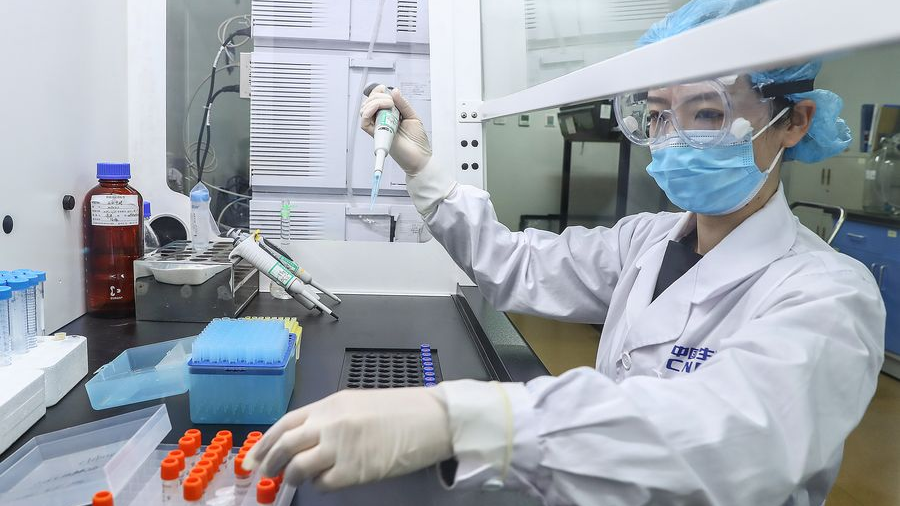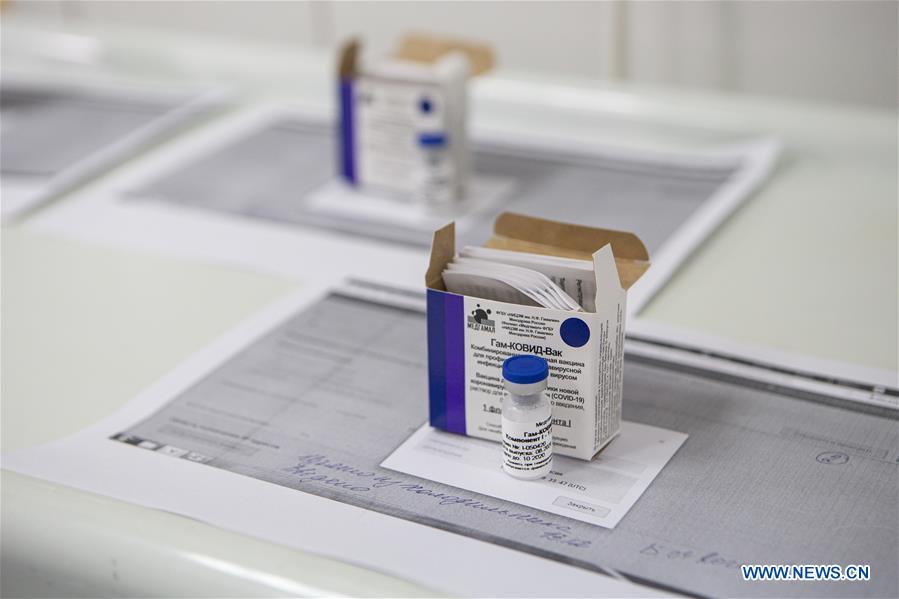
A staff member tests samples of a COVID-19 inactivated vaccine at a vaccine production plant of China National Pharmaceutical Group (Sinopharm) in Beijing, April 11, 2020. /Xinhua
A staff member tests samples of a COVID-19 inactivated vaccine at a vaccine production plant of China National Pharmaceutical Group (Sinopharm) in Beijing, April 11, 2020. /Xinhua
Editor's note: Iram Khan is a Pakistan-based commentator on international affairs. The article reflects the author's views, and not necessarily those of CGTN.
If the world wishes to truly defeat the COVID-19 pandemic, there is no denying that it will have to join forces. Collaboration in research, data collection and testing is a prerequisite to developing successful vaccines. But in the face of growing unilateralism, emphasis on coaction has become all the more necessary.
One vaccine, being co-developed by Chinese, German and U.S. companies, highlights the significance of cooperative ventures that are direly needed in this difficult time. The project by China's Fosun Pharma, Germany's BioNTech and Pfizer of the U.S. has entered late-stage clinical trials.
At the same time, China has parallel promising vaccine projects with Russia and Canada. It is important to note that the joint efforts are progressing well despite some political friction between China and the U.S. and China and Canada. In an encouraging sign, most countries are partnering while keeping their differences aside.
COVID-19 has long surpassed being a national crisis of a single country. It's a global health emergency and thus requires a global solution. China, at this testing moment, has been the torchbearer in fostering the requisite global spirit.
Immediately after the initial wave of infections passed, China opened its factories and focused on manufacturing and donating personal protective equipment (PPE) for healthcare professionals and other sections of the public. It also made sure that stocks were available for governments that could afford to buy them in bulk.
On the vaccine front, Chinese scientists quickly got down to research on the back of their experiences in handling past epidemics like SARS and MERS. While they were hard at work in their laboratories, President Xi Jinping announced at the 73rd session of the World Health Assembly that vaccine development and deployment in China, when available, will be made a global public good.
China successfully mapped the gene sequence of the novel coronavirus early on and shared it publicly. This gave a head start to scientists in centers for disease control around the world to begin the pursuit of an antidote.

Russia's new COVID-19 vaccine named "Sputnik V" during the phase-3 clinical trials in Moscow, September 15, 2020. /Xinhua
Russia's new COVID-19 vaccine named "Sputnik V" during the phase-3 clinical trials in Moscow, September 15, 2020. /Xinhua
Consequently, there are several vaccines today that are in advanced stages of clinical trials. China is taking the ones it has developed to various regions for trials and has also brought those developed by others to China. This practice is extremely helpful in identifying the immunogenicity caused by environmental and genetic differences.
It must be remembered that a collaborative approach in research reduces the cost and increases the speed of development. Sharing information and data allows groups to build upon each others' findings and avoid wasting time on unfeasible options. In isolated programs, on the other hand, every entity has to strive its way up from scratch.
The power of the collective human intelligence cannot be understated where the whole is greater than the sum of its parts. Unlike the past, research findings do not need to be carried in heavy boxes and transported to another continent to be applied. Internet connectivity has not only reduced this time to minutes but has also allowed geographically dispersed professionals to work together with seamless synergy.
This marvel of communication technology faces a new kind of challenge that the World Health Organization (WHO) calls "vaccine nationalism." It is the tendency of certain states to protect their research and secure contracts with pharma companies for exclusive supply of COVID-19 vaccines. This approach, unfortunately, jeopardizes provisions for frontline workers and vulnerable groups elsewhere.
Till the time there is even a single infected person, vaccine nationalism will fail to protect those who are adopting this pernicious policy. If COVID-19 started with infecting one person or one group of people, it can easily make a comeback in the face of selfishness in the production and distribution of the vaccine.
By building "a community with a shared future for mankind," a concept advocated by Chinese leaders, any space for vaccine nationalism becomes non-existent.
The pandemic has already caused a massive hit to transnational solidarity. Political blocs are finding it hard to mitigate each other's sufferings and some countries took up "modern piracy" while acquiring PPEs. After the emergence of such deplorable attitudes, faith in the spirit of humanity must be restored by putting up united actions in vaccine development.
China's co-production of vaccines with other countries is an excellent example of investing in mankind's shared future. The process needs to continue. Even in the event of any subsequent global emergency, joint endeavors should be made the central pillar of all strategies.
(If you want to contribute and have specific expertise, please contact us at opinions@cgtn.com.)